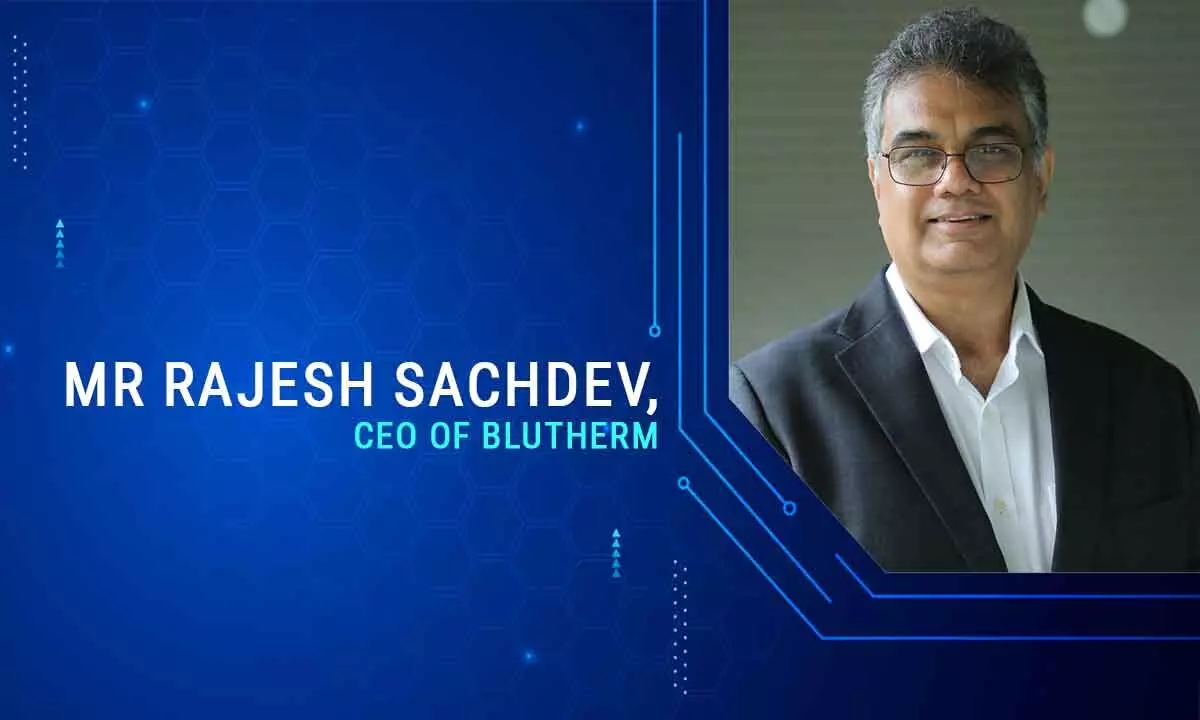Live
- ACB hands over key documents to ED in the Formula E car race case
- How to Use Meta AI on WhatsApp for Creative Interactions
- FIIs remain net investors in India this year amid robust economy, resilient market
- Telangana government grants extended timings for pubs and parties on the eve
- Beed sarpanch murder: Kin, Maha Oppn parties, social groups take out silent march
- UAE Tops Global Mobile Internet Speeds; India Ranks 25th Worldwide
- Over one third Americans take on debt in holiday spending: Survey
- Climate change risks impacting financial system, need India-specific data: RBI’s Rajeshwar Rao
- Nitish Kumar Reddy is a star of Indian cricket, says Sunil Gavaskar
- Winter Hydration Made Easy: 5 Essential Tips to Stay Healthy
Just In
Transforming Homes: The Impact of AI and IoT on Smart Home Appliances - An Interview with Mr Rajesh Sachdev


Discover how AI and IoT revolutionise home automation as Mr Rajesh Sachdev shares insights on smart home appliances.
In a recent interview with The Hans India, Mr Rajesh Sachdev, CEO of Blutherm, a prominent figure in the technology industry, shed light on the transformative impact of smart home appliances. As the founder of a leading tech company specialising in AI-driven solutions, he discussed the evolving landscape of home automation and the role of innovative technologies such as artificial intelligence (AI) and Internet of Things (IoT) connectivity. With a focus on the latest advancements in cleaning robots and smart water heating and ventilation systems, Mr Sachdev provided valuable insights into how these cutting-edge technologies are revolutionising how we interact with our living spaces.
Mr Rajesh Sachdev, CEO of Blutherm
The rapid evolution of technology, notably artificial intelligence and IoT connectivity, has undoubtedly revolutionised our homes. How do you see these innovations reshaping our living spaces?
The infusion of AI and IoT into smart home appliances marks a transformative shift in our domestic landscape. These advancements go beyond convenience, driving efficiency and sustainability while seamlessly integrating into the modern consumer's tech-centric lifestyle. By optimising resource usage and offering a holistic experience, smart appliances are reshaping our homes into intelligent ecosystems that adapt to our needs while minimising environmental impact.
This convergence of technology and lifestyle preferences is not only enhancing our daily routines but also paving the way for a more interconnected and sustainable future. With smart appliances at the helm, our living spaces are becoming dynamic environments that cater to our preferences while promoting eco-friendly practices, ultimately redefining the way we interact with and inhabit our homes.
You mentioned the integration of AI in cleaning robots as a significant advancement. Could you elaborate on how this technology is transforming household cleaning practices?
Ans: AI-powered cleaning robots are revolutionising household cleaning by offering a paradigm shift in approach. These intelligent devices autonomously navigate through homes, adapting their cleaning methods to diverse surfaces and environments. Through sophisticated AI algorithms, they optimise cleaning routes, guaranteeing thoroughness and efficiency. The result is not just time saved but a notably superior cleaning experience for homeowners, promising a future where mundane chores are effortlessly managed with cutting-edge technology, leaving households cleaner and more comfortable than ever before.
How are tankless water heaters revolutionising both residential and commercial settings?
In the realm of water heating, tankless water heaters have emerged as true game-changers. Particularly in urban areas facing water scarcity, these innovative systems offer unparalleled efficiency and sustainability. By heating water on demand and bypassing the need for storage tanks, they eliminate wastage and significantly reduce energy consumption. This approach not only addresses critical environmental concerns but also meets the demands of modern living, where efficiency and sustainability are paramount.
In commercial applications such as large kitchens and laundromats, advanced gas tankless water heaters are vital in meeting high-demand requirements. By providing hot water precisely when needed, these systems minimise environmental impact while ensuring optimal performance in demanding settings. This dual focus on efficiency and sustainability underscores the transformative potential of tankless water heaters across residential and commercial sectors alike.
Post-Covid, ventilation has become a prominent concern. What trends do you observe in this domain?
The pandemic has underscored the importance of proper ventilation in indoor spaces. As a result, there's a notable trend towards mechanical ventilation systems equipped with state-of-the-art features such as EC motors and IoT connectivity. These systems provide precise control over airflow and enable seamless communication with users. By automating ventilation processes based on user-defined parameters, they ensure optimal efficiency and sustainability while adhering to regulatory standards.
It's evident that smart home appliances are not only convenient but also pivotal in fostering more sustainable and efficient living environments.
Ans: Indeed, these advancements signify a profound shift in our approach to daily living and home management. By seamlessly integrating cutting-edge technology into our domestic environments, we are fostering spaces that are not only technologically advanced but also environmentally conscious. This paradigm shift extends beyond mere convenience, as smart home solutions optimise resource usage and promote sustainability in ways previously unimaginable.
These transformative developments are shaping homes into dynamic ecosystems that adapt to our needs while minimising environmental impact. From AI-powered cleaning robots to energy-efficient appliances, each innovation contributes to a more efficient and eco-friendly living environment. Ultimately, we are witnessing the evolution of homes into smart, sustainable havens that cater to our modern lifestyle needs while safeguarding the planet for future generations.

© 2024 Hyderabad Media House Limited/The Hans India. All rights reserved. Powered by hocalwire.com






